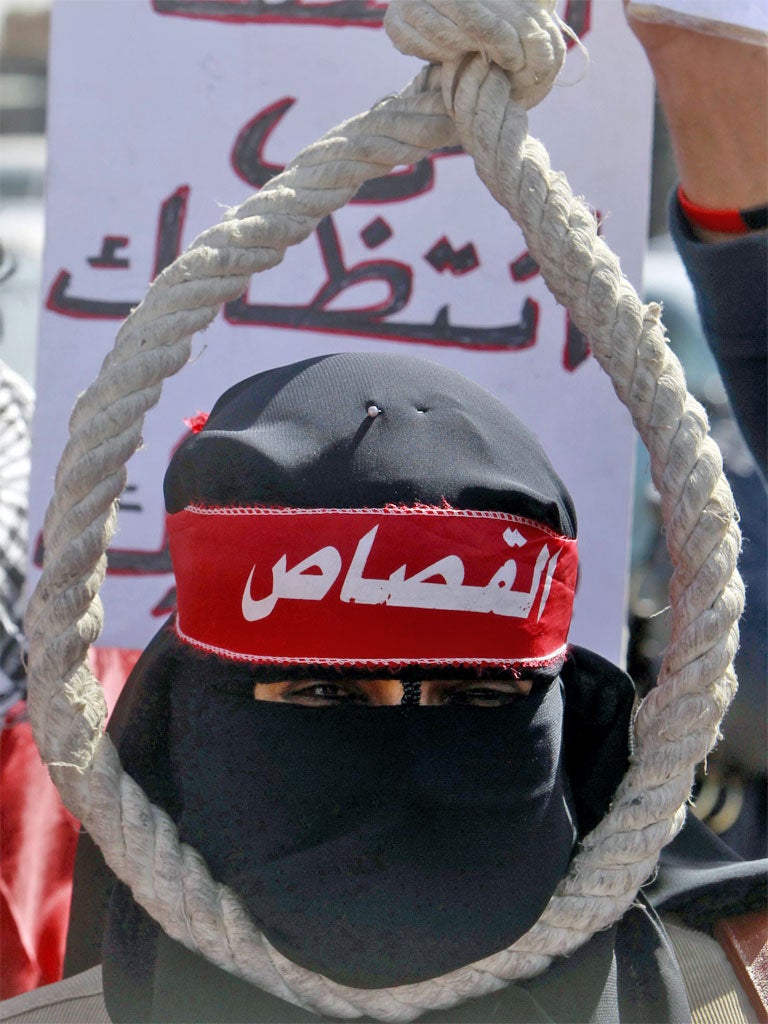Prosecutor tells Mubarak he faces death by hanging
Ex-President snubs final chance to address court after claims he ordered shooting of protesters

Your support helps us to tell the story
From reproductive rights to climate change to Big Tech, The Independent is on the ground when the story is developing. Whether it's investigating the financials of Elon Musk's pro-Trump PAC or producing our latest documentary, 'The A Word', which shines a light on the American women fighting for reproductive rights, we know how important it is to parse out the facts from the messaging.
At such a critical moment in US history, we need reporters on the ground. Your donation allows us to keep sending journalists to speak to both sides of the story.
The Independent is trusted by Americans across the entire political spectrum. And unlike many other quality news outlets, we choose not to lock Americans out of our reporting and analysis with paywalls. We believe quality journalism should be available to everyone, paid for by those who can afford it.
Your support makes all the difference.The deposed Egyptian President Hosni Mubarak was last night facing the possibility of death by hanging as the final session in one of the most sensational trials in recent history drew to a close.
Given a last opportunity to address the court in Cairo, where for much of the past six months he has lain on a hospital bed in a cage listening to the evidence against him, Mr Mubarak refused, telling the judge he had no comments to make.
"What the lawyer said is enough," said the 83-year-old, whose reign began in a bloodbath after he saw his predecessor, Anwar Sadat, gunned down before his very eyes during a military parade in Cairo back in 1981.
The chief prosecutor made it clear earlier this week that if convicted, Mr Mubarak could suffer a similarly undignified denouement, and the hangman's noose. Mustafa Suleiman told the court that the former President, whose two sons are being tried alongside him on corruption charges, authorised the use of live ammunition to be used against protesters.
"This is not a case about the killing of one or 10 or 20 civilians, but a case of an entire nation," said Mr Suleiman.
Mr Mubarak's co-defendants also include his former Interior Minister Habib al-Adly and four senior security officers. All of them should receive the death penalty, said Mr Suleiman.
More than 800 people were killed in the 18 days leading up to Mr Mubarak's ousting last year.
Habib al-Adly spoke for 90 minutes during yesterday's session. He accused "foreign saboteurs" of being behind the uprising, saying they had "desecrated Egypt's pure land" with the aid of unnamed Egyptian co-conspirators.
But despite calls for the death penalty from Egypt's chief prosecutor, some believe it is unlikely that Mr Mubarak will be executed. According to Maha Maamoun from the Hisham Mubarak Law Centre, an organisation whose lawyers are representing some of the victims' families at the trial, even if Egypt's former ruler is eventually convicted, there may not be enough evidence to guarantee a death penalty.
"There just doesn't seem to be enough against Hosni Mubarak or Habib al-Adly," she said. "At the moment maybe they are 50 per cent sure. But they need to be 100 per cent sure."
That will not be enough to satisfy some of the families of those killed. The wife of Said Mostafa, a bus driver killed in the early days of the uprising, told The Independent that the former President's execution was "the least they can offer to the martyrs".
The trial itself has been dogged by criticism. When the Egyptian leader, Field Marshall Hussein Tantawi, a former friend and long-time colleague of Mr Mubarak, was called to testify last year, all of his evidence was given in camera, bringing claims of a stitch-up. There have also been numerous delays, raucous outbursts of courtroom squabbling and failed attempts by lawyers to get new judges appointed to the case. "It's just a play," said Malek Mostafa, a blogger who was imprisoned under Hosni Mubarak. "They are just fooling the people."
The trial comes just days before another landmark case, that of 16 Americans and 27 others who all worked for NGOs targeted in a crackdown on civil society by the Egyptian government.
They face charges involving the illegal use of foreign funds in a case that has cast a shadow over Egypt's decades-old alliance with the United States.
Join our commenting forum
Join thought-provoking conversations, follow other Independent readers and see their replies
Comments